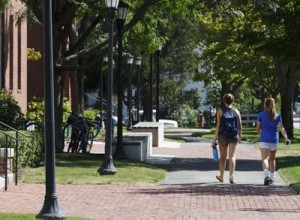 Young people can take action against climate change in their everyday lives, and Milton’s student environmentalists are hard at work to encourage earth-friendly practices on and off campus.
Young people can take action against climate change in their everyday lives, and Milton’s student environmentalists are hard at work to encourage earth-friendly practices on and off campus.
Actions as simple as being conscious of recycling and composting, turning off unused lights, and taking shorter showers can have a multiplier effect on students, says Ariane DesRosiers (I), co-head of the Lorax environmental group and the Gardening Club, green proctor in Hallowell House, and a leader on the Independent School Sustainability Coalition (ISSC), a network of students at more than 25 independent schools in New England working to make their campuses greener.
“When people see their peers going out of their way to do these things, they understand that it’s important to be responsible consumers,” she says.
Students have several opportunities to participate in sustainability efforts on campus, at home and in their communities, says science faculty member Linnea Engstrom, who advises the student Sustainability Board and the Sustainability Commission, which focuses on the School’s environmental practices. During the week of Earth Day, April 22, several events and initiatives across campus will encourage students to make greener choices.
Milton now has a partnership with TerraCycle, which accepts certain products that generally can’t be recycled, such as tooth care products, as well as used EOS and Burt’s Bees products. There are two TerraCycle donation sites in the Student Center.
“Depending on the choices you make while you’re consuming, you’re actually deciding the kind of waste you’re producing,” Linnea says. “Think about the things you buy in the context of how much packaging comes with those things, and try to buy whatever has the least packaging.”
Linnea and Ariane listed other actions students can take to be more environmentally friendly:
- Carry reusable water bottles and avoid using single-use plastics
- Learn about the materials that can be recycled and how
- Compost uneaten food—SAGE dining services provides compost bins, and home composting is easy to start
- Eat fewer meat products
- Unplug chargers and cable boxes when not in use
- Properly recycle unwanted electronics—Milton will host an e-waste recycling event from 1–4:30 p.m. on Earth Day, April 22
- Volunteer at a local community garden through the Gardening Club; help with Milton’s on-campus garden plots
- Submit writing or art to Gaia, the ISSC’s online eco-publication
- Join student clubs like the Sustainability Board and Lorax to learn more about environmental issues
- Volunteer or intern during the summer with nonprofits focused on environmentalism
Students can also take political action, Ariane says. Students around the world are participating in coordinated efforts to capture the attention of political leaders with the power to create climate and environmental policy, and to address local, environmentally unfriendly practices. They aim to convey the urgency of climate change and the need for drastic action, as another global temperature increase could result in catastrophic drought, food shortages, floods and wildfires.
“As students are inspired to stand up, we’re seeing governments and major organizations all over the world actually pay attention and take action,” Ariane says. “Although we’re still waiting for the United States government to show the same level of action as in Europe, the things we can do locally will have an effect on our own community.”